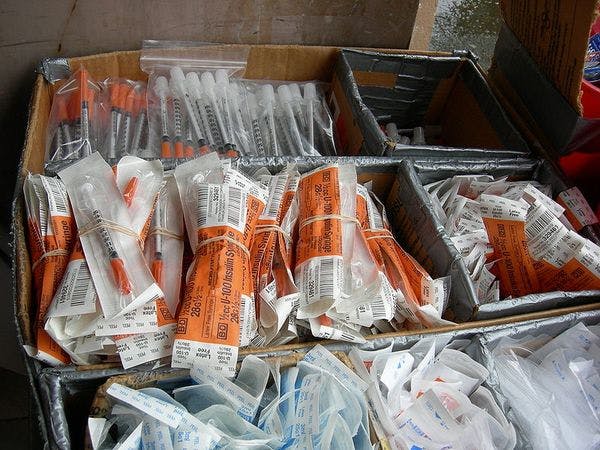Wikimedia Commons - Joe Mabel
Advocates welcome major change concessions in government of Canada's prison needle exchange announcement
Today, Public Safety Minister Ralph Goodale and Correctional Services Canada (CSC) Interim Commissioner Anne Kelly quietly announced a prison needle exchange program (PNSP) to be implemented in two federal prisons. Many prisoners, public health experts and advocates, including the Canadian HIV/AIDS Legal Network, have fought for more than 20 years for prisoners to have access to these types of vital health programs in Canada’s prisons. In fact, in September 2012, Steven Simons, a former prisoner, the Legal Network, Prisoners with HIV/AIDS Support Action Network (PASAN), CATIE and the Canadian Aboriginal AIDS Network (CAAN) launched a constitutional challenge against the Government of Canada over its failure to make sterile injection equipment available to federal prisoners and prevent the spread of HIV and hepatitis C (HCV) in federal prisons. This litigation is ongoing and continues to be necessary to ensure meaningful protection of the health and wellbeing of all federal prisoners, many of whom are from vulnerable and marginalized populations, including Indigenous populations. Today’s announcement by the Government of Canada reflects a significant concession by the federal government on the importance of PNSPs. As knowledgeable public health experts and advocates have maintained for years and the government now finally accepts, PNSPs are safe, effective and crucial to protect prisoners’ health. Moving forward, litigation is still necessary to ensure that the government completes the task as soon as possible and implements PNSPs in all federal prisons, in accordance with the evidence and public health principles. Every day without access to PNSPs violates prisoners’ fundamental Charter rights. It is clear that the Government of Canada now recognizes the solid and mounting international evidence about the effectiveness of PNSPs in preventing needless HIV and HCV infections behind bars. It is also clear that the federal government understands that PNSPs “are not associated with increased attacks on prison staff or other inmates, contribute to workplace safety, facilitate referral to available drugdependence treatment programs, and can coexist with other drug prevention and drug dependence treatment programs.” These are welcome developments, but will require determined follow-through, including the engagement of prisoners and the applicants in this lawsuit, to ensure that this important program is actually implemented, and that PNSPs are accessible and effective. Further information on our ongoing lawsuit against the Government of Canada can be found at http://www.prisonhealthnow.ca/.
